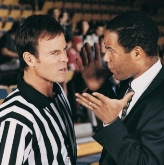A recent high school football incident resulted in the forfeiting of the game when the head coach, after disagreeing with an official's call, called a time out, then instructed his team to NOT return to the playing field. The forfeiture came AFTER the coach was assessed his second delay of game penalty, a penalty that would have resulted in his ejection from the game, and one that he chose to ignore. This action coupled with his refusal to have his players take the field resulted in forfeiture of the game to his opponent.

Forfeiting a game or ejecting a player or coach is not something officials take lightly. Ejections are emotional, disrupt game flow and cost all game participants time, energy and focus. Ejections usually only occur after warnings and technical fouls fail to eliminate the unsafe or unruly behavior that such penalties were intended to address.
The National Federation of High School Associations (NFHS) rules clearly state the circumstances in which a coach or player shall be ejected and/or disqualified from further participation. In basketball, for instance:
- a player is ejected, upon receipt of his/ her 5th personal foul, or two direct technicals or a flagrant foul.
- a coach is ejected after getting his second direct technical or his third cumulative technical ( indirect or direct).
- Multiple players on the court or on the bench can be ejected if they get in a fight or act as if they are going to be in a fight.
- If a player is ejected, he/she must sit on the bench.
- If a coach is ejected, he/she must leave the gym area- completely. A coach ejection only temporarily disrupts the game because the assistant coach can replace him to allow the game to continue.
Preventive officiating
Game forfeiture, on the other hand, ends the game immediately with the reported final score dependent on which team which team caused the forfeit. The NFHS basketball forfeiture rule states:
"The referee shall forfeit the game if a team refuses to play after being instructed to do so by an official. The referee may also forfeit a game if any player, team member, bench personnel, or coach fails to comply with any technical foul penalty or repeatedly commits technical foul infractions or other acts which make a travesty of the game". If the team that the game is forfeited to is ahead, the score at the time of forfeit shall stand. If on the other hand the team that the game is forfeited to is behind, the score shall be recorded at 2-0, in their favor."
Officials practice "preventive officiating": the crew's calls and warnings are aimed at minimizing the opportunity for rough play to escalate and allow coaches and players sufficient latitude to disagree with officials, within reason. Preventive officiating, if executed well, minimizes the chance of game forfeiture, but there is no guarantee. Prevention is squarely on the shoulders of the coach and that of the team he/she leads.
Forfeiture of a game is costly to the school, players, coaches, officials, fans and parents of all teams involved. It is the ultimate penalty for poor sportsmanship, but one of the most preventable.
Barbara Bleiweis is a working mom, high school basketball official and youth sports advocate. She lives in McLean, VA, raising two teenagers and two cats.
Posted September 12, 2011








